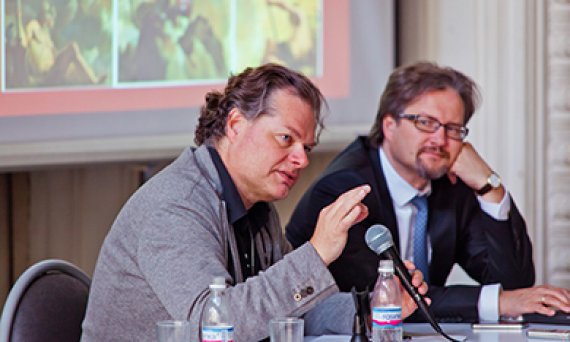Martin van Gelderen, an expert in the history of political thought, shared his reflections on the vast gap between classical republican theory and the modern political structure of the EU. He examined this from the perspectives of two of the most important Republican ideologues: James Madison and Hugo Grotius.
The republican ideal, the fruit of political thought originating in Antiquity, was fully formulated by the 17th century Dutch thinker, Hugo Grotius. There are two main components of this theory that are closely interconnected. One is the anthropocentric value model, where a human’s freedom from the suppression of freedom is recognized as the highest manifestation of liberty. Essentially, this is in general terms the same as what we now understand as the modern liberal concept of personal liberty (or negative liberty)—that is, freedom that is not externally imposed, and man’s ability to independently choose his own path in life. However, unlike modern liberalism, the concept of Republican liberty is not limited to such a negative definition. Another no less important component to Republican theory is political liberty, or positive liberty. That is, in order to have the first component, it’s necessary to participate in the governing of the society to which an individual belongs. Without such active participation, the first liberty—personal—remains dependent on those who make policy decisions. Thus, the Republican ideal of citizenship implies direct active participation in the affairs of community management primarily through the institution of direct democracy. It is primarily as a result of this that the Republican model was implemented only in comparatively small societies where such a form of democracy was possible.
Liberalism and Republicanism diverged somewhat at the moment when the question of applying the Republican model to large communities arose after the American Revolution. The heated debates that followed about principles of administration generated much of the representative government model, which is now often associated with democracy in general. In this context it seems no accident that the choice of the second classic theorist was the fourth president of the United State, James Madison. Madison was the youngest signatory of the Declaration of Independence (literally saturated with Republican ideas), one of the authors of the Constitution, and the co-author of the “Federalist” journal. While still at college, James Madison was equally influenced by Grotius’ Republican ideas as by the social contract theory of Thomas Hobbes. Nonetheless, it was he who became one of the leaders of the Federalist Party, advocating for the creation of a strong federal government and House of Representatives (i.e. the U.S. Congress) elected on territorial criteria rather than on the basis of equal representation from each state. The opponents of the Federalists—the Anti Federalists—criticized the former of attempting to create a despotic system infringing on the rights of individual states and citizens. The dispute ended in the Great Compromise, which brought the positions of each party somewhat closer together. At this moment, however, the idea of representative democracy, rather incompatible with classical Republican theory, began its victory march throughout the world.
In light of the evolution of Republican theory and the birth of modern Liberalism from it, it is interesting to observe the modern EU more and more on the path of conversion from a confederation into a federation. If the idea of negative liberal freedom was initially accepted here, undoubtedly, as a supreme value, then the previous form of Republican positive liberty left not a trace on the European Commission. Citizens of certain countries entering the EU can influence the policy of pan-European authorities only very indirectly. If it’s still possible to speak about such an influence (though Republicanism implies direct participation in government rather than through organs of representative democracy) on the level of national governments, then the principles forming the European Commission remain completely opaque. In actuality, the EU controls the countries with the largest shares in its integrated economy. Meanwhile, the removal of citizens from administration jeopardizes the values split equally by Republicans and Liberals. What is the way out? Most likely, it stands to search for an exit in the creation of an institution of European citizenship and to change the principles of forming individual organs of power with the European Union.
Alexei Vovin













